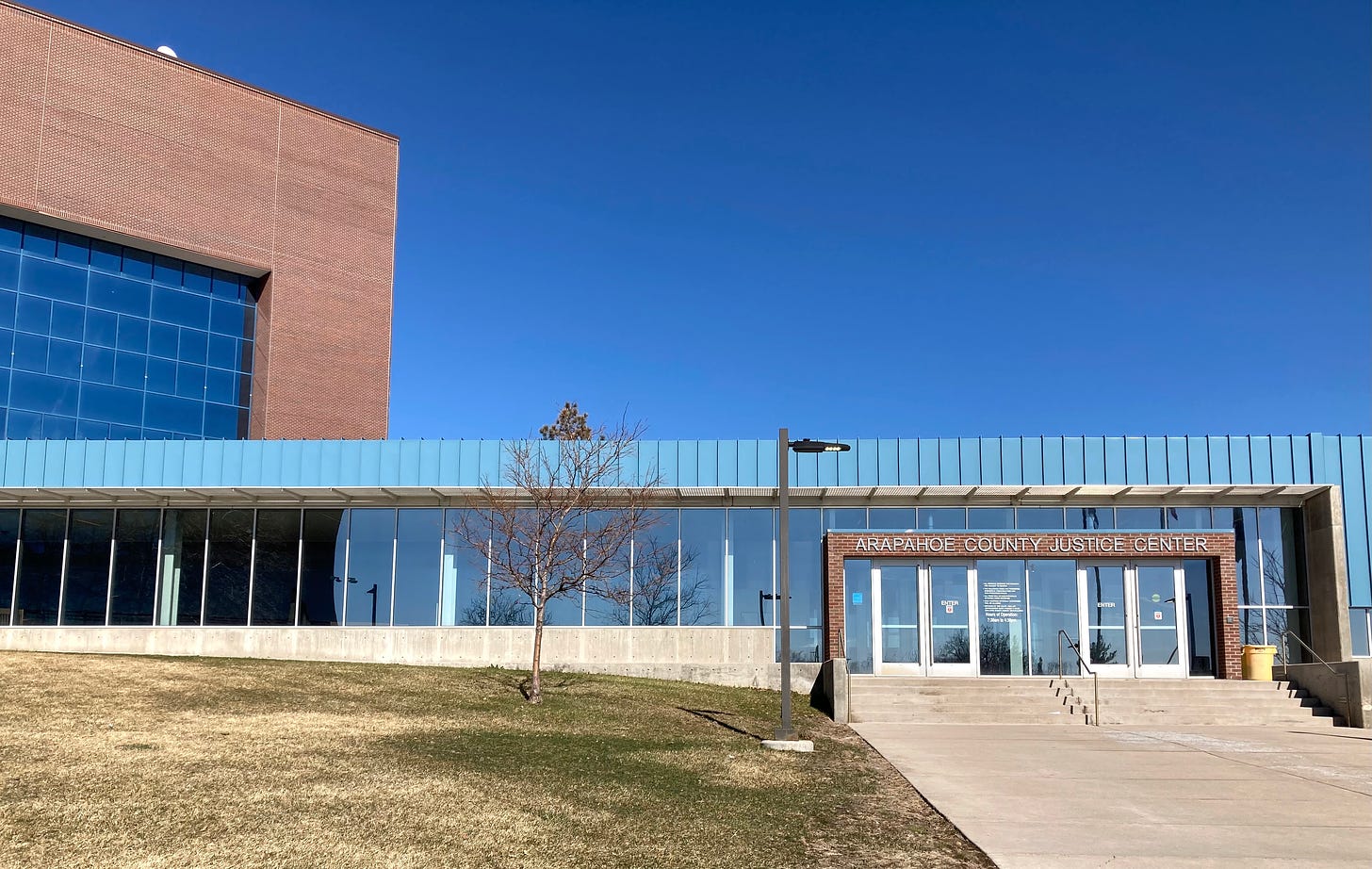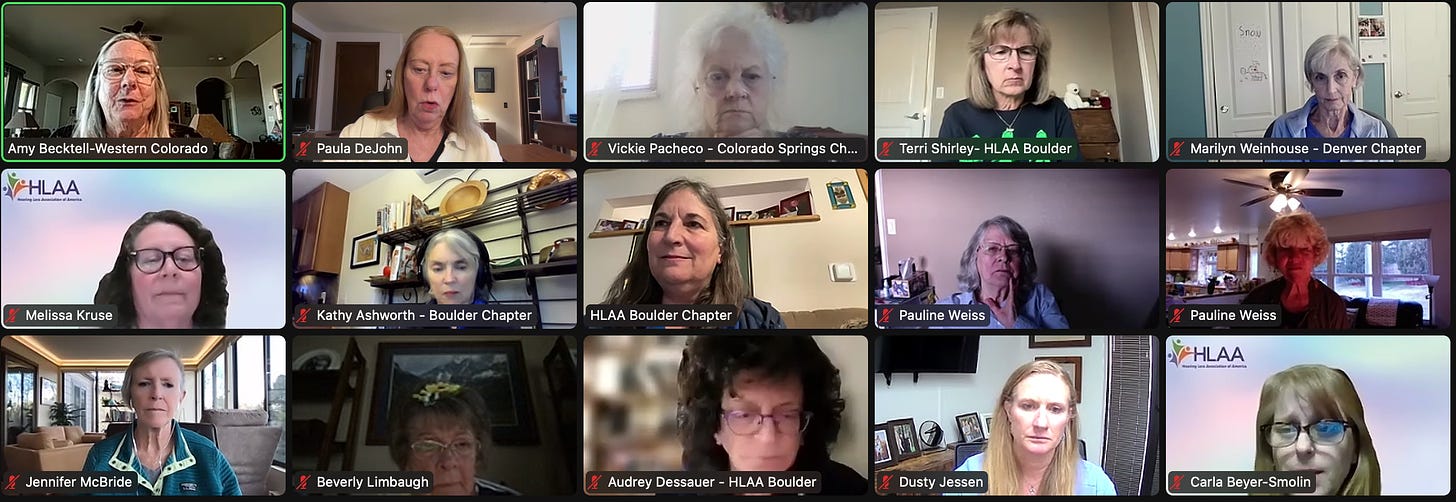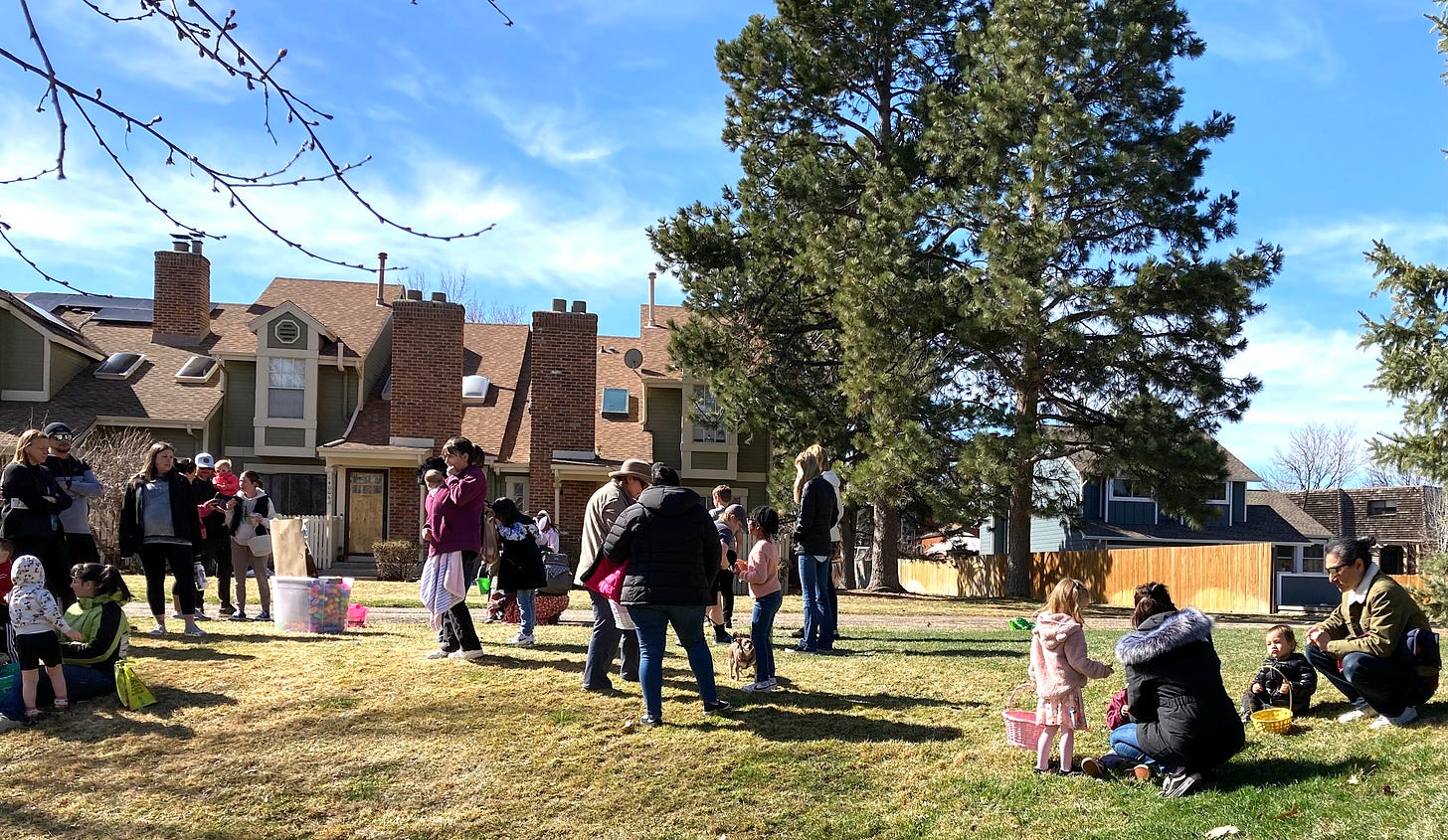By Paula DeJohn
My recent experience with jury duty was cut short when the trial was continued, but I can offer another verdict: Courtroom captioning works.
To recap: A jury summons ordered me to report to the Arapahoe District Court on April 3, 2024. In very fine print on the back, a section offered accommodation under the Americans with Disabilities Act (ADA) and an online form to request them.
Well, I thought, here’s a chance to put to use the information I’ve learned at Denver Chapter meetings and a stint with the Legal Auxiliary Services Advisory Council of the Colorado Commission for the Deaf, Hard of Hearing and DeafBlind.
I looked up the form on the court’s website. It’s www.courts.state.co.us, and covers all the counties and districts in Colorado. It asked, basically, “What is your disability?” and “What do you need?” I replied, “I have hearing loss, and despite hearing aids, I have trouble hearing on the phone and in crowded environments. I would need live captioning.”
I received an immediate email reply: “Request for accommodation is granted.”
In the hall of justice
On trial day, I got in line with other prospective jurors on the steps of the Justice Center, waiting for the doors to open. The square, modern building loomed sharply against the bright morning sky. When the doors opened, we marched through airport-style security checks. At the end stood a military sentry in full battle gear, with a K9 dog. When he saw me staring, he pointed down the hall to the jury assembly room.
No sooner had I sat down than someone called my name. I raised my hand, and captioner Trish Messenger strolled toward me with her suitcase. She quickly set up a laptop and transcription keyboard, and said, “Hey, I know you!”
She works for Visible Voices and has attended Denver Chapter meetings, as well as some commission meetings. She has worked with Secretary Marilyn Weinhouse to arrange equipment for our Koelbel Library meetings. And, she grew up in Grand Junction, where we have a mutual friend—Western Chapter president Amy Becktell. As we chatted, the man behind me interupted to tell us his girlfriend works for Cochlear America, the implant company. I invited him to invite her to come to our meetings.
Along with our “old home week” chattering, Trish was typing both our comments and announcements from court staff. The laptop screen faced me—like the one I’m typing on now—so anytime I missed a word I could look down and see it.
Clarity in the courtroom
I was surprised and relieved. I had only seen captions projected on walls or video screens, and I was wondering if I’d have to read them off the judge’s forehead. Our phones had to be turned off, so there was no chance the words could be transmitted there.
But no, I had a personal transcriber, as Trish sat next to me. She explained that she had been a court reporter for 20 years before switching to captioning. Seeing the justice system from the inside was a revelation, she recalled. “It changed me, to see how unfair it can be to some people.”
After filling out questionaires we prospective jurors were given colored badges. Soon after, those with red badges were dismissed and filed out into the sunshine.
As I waited with my purple (I called it “plum”) badge, Trish wondered if the courtroom would have a location where she could plug in her laptop, as the battery was already running low. Specifically, would it be close to the jury box for my benefit?
We did not have a chance to find out. Shortly after 9 a.m. the jury commissioner announced that purple badge wearers were excused, as the trial had been continued.
We parted and I headed for the parking lot, feeling as if I’d put in a full day’s work. What I’d learned was that a dedicated captioner like Trish can make it possible to participate fully in the work of justice, even without the best of hearing. <>
Chapter leaders set goals
In what they hope will become a new tradition, HLAA chapter leaders from around Colorado met April 9 for a Zoom conference. National HLAA officials Melissa Kruse and Carla Beyer-Smolin attended from their offices in Maryland and Ohio. The group agreed to focus on efforts to increase awareness, funding, and membership through innovative programs and policies.
While fundraising is important through walks for hearing and other promotions, the traditional $25 annual fee to join the national organization may be discouraging some people from joining, so Melissa proposed reducing the fee to whatever a prospective member can afford. “It could be as little as a dollar,” she said.
Colorado Chapter Coordinator Debbie Mohney suggested resurrecting a former tradition of support groups within or outside of chapters, where people could meet informally. “Many chapters started as support groups,” Carla noted. Such groups cannot solicit donations, she added.
A benefit of online meeting platforms such as Zoom is that they allow people in far-flung states like Colorado to get together for discussions. However, not everyone is comfortable with computer-based communications. Some, such as Boulder Chapter president Terri Shirley, are advocating hybrid meetings, in person but with cameras providing a Zoom connection.
Finally, Wynne Whyman urged the group to continue promoting her Let’s Loop Colorado movement to install hearing loops in public places. “I’m still going around Colorado,” she said, “and I’m ecstatic about how much reach it is getting—and we just have to ask for it.”
Beyond 911: Agency seeks to improve emergency access
The Colorado 911 Task Force Equal Access Committee is hosting a Town Hall on May 11 to discuss emergency access for people with disabilities in Colorado.
According to Telecommunications Relay Service administrator Holly Bise, the committee wants to solicit feedback on how to improve emergency access for Coloradans with disabilities as well as provide education to communities on how to ensure their communication with 911 and emergency services is as effective as possible. “This event will include those who are deaf and hard of hearing, and will have a heavy focus on hearing loss communities and emergency services,” Bise says.
The town hall will be in person at 201 S Cherokee St. Denver, CO 80223 at Atlantis Community Apartments in the Community Room.
The agenda will include:
Panels discussing the challenges with emergency services for those who may not access 911 in a traditional manner
Opportunities to ask questions to emergency service professionals and to offer feedback on improving access in Colorado
Refreshments and entry into a raffle for all attendees for a chance to win prizes.
Attendees can use this link to RSVP to attend and take a survey about their experiences using emergency services. For more information contact holly.bise@state.co.us.
Looking for comments
With this Substack format, readers can reply to every issue by clicking on the “Comment” button at the bottom of the screen. Some folks like to respond directly by email, which is fine, but by posting a comment, you can be sure all other readers will be able to see it, and offer their own views. Even people who are unable to attend monthly meetings will then have a chance to be part of the discussion. Try it, and I’ll be checking regularly to see how you think we’re doing.
Lunch Bunch
Denver Chapter members and guests will meet for lunch Friday, April 26 at noon at Panera Bread, 2466 S Colorado Blvd, Denver, CO 80222.
It’s Walk 4 Hearing season
The HLAA national website, hearingloss.org, is promoting the planned Walk for Hearing events for 2024. One of the commenters featured on the site is Colorado’s own state coordinator, Debbie Mohney. She says in the April 16 post:
It's Walk4Hearing Day today! I walk to raise awareness about hearing loss and to spotlight Hearing Loss Association of America (HLAA) as a valuable resource and organization. If you have hearing loss, you also benefit from all of the great advocacy work done by this organization.
The spring Walk4Hearing season launches on May 18, and so far 136 teams and 542 people are registered. To find a walk near you, visit walk4hearing.org.
Egg hunt
This was the scene in my front yard during Easter weekend.







